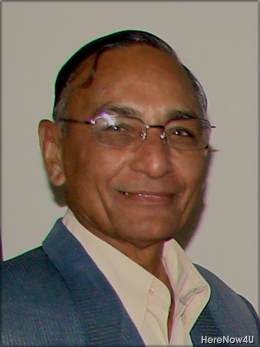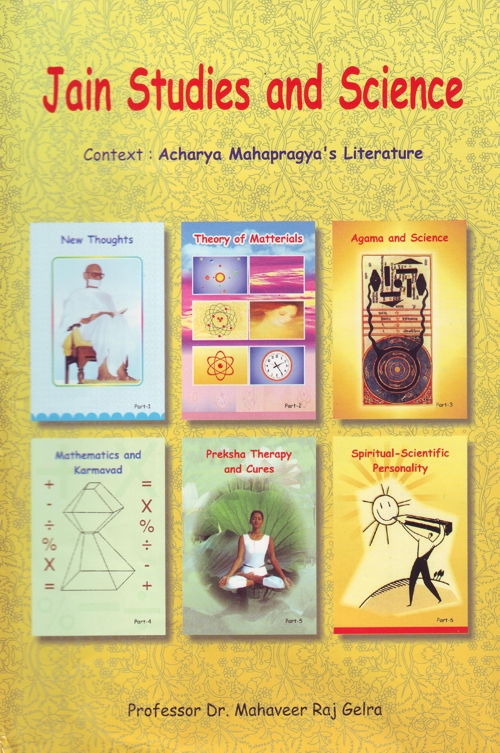The President Dr. A.P.J. Abdul Kalam, in the company of Acharya Mahapragya, had a dialogue on the problems of the country with other Acharyas, maulvis, priests, saints, and philosophers on 15 October 2003. This dialogue on the subject of "Unity of Minds" culminated in the form of the Surat Spiritual Declaration dedicated to the people. The statements made by Acharya Mahapragya and President Kalam are reproduced here for the benefit of the readers.
Acharya Mahapragya's Address
In his message prepared for the Conference, Acharya Mahapragya said, "Awakening of spiritual consciousness and development of moral values - this is the platform of the universal religion. From this platform, all religions can send out a message of unity."
Communal harmony
"Each religion can have its own modes of worshipping and devotion and nobody can have any kind of objection with regard to this. The divergence in religious concepts is actually on account of different modes of worship.
If we bring ourselves to value freedom of thought and devotion to faith, then in spite of the divergences we can come close to each other, can share the same platform of spirituality and morality and engage ourselves in identical pursuits. If we can prepare the background for such contemplation, a new sun can arise on the horizon of the world."
Why do we neglect moral values?
"In the field of religion, moral values are not being given importance. As a result, a religious person does not hesitate in resorting to unrighteous conduct. Similarly, in the field of religion, spirituality is not being given importance either, and as a result the dream of the unity of mankind is not being realized. No improvement is taking place in human relations."
Spiritualisation of religion
"Spirituality is the path to the development of pure consciousness. The consciousness, which develops as the attachment and animosity diminish, has three resultants:
- calm disposition, feeling of real peace
- detachment
- compassion
These are the main consequences of religion. It is only religion which can be of benefit to both the individual and society. In order to achieve this, the following are necessary:
- development of concentration
- development of the capacity to resolve
- mitigation of one's state of agitation
These three powers have nothing to do with any particular community. They can be a common platform for all communities."
Spiritual-scientific personality
"Our fundamental objective must be: building up of the spiritual-scientific personality. A purely spiritual personality can neither present its spiritual contemplation in the language of the contemporary times nor can influence contemporary thinking. A purely scientific personality cannot transcend the limits of matter to touch the consciousness, and therefore, it cannot solve problems arising out of consciousness.
It is, therefore, a requirement of the times that every enlightened person become spiritual-scientific.
Only that person can become spiritual who can exercise control over his impulses. It is surprising that even religious persons do not show perseverance in controlling their impulses. For controlling our impulses, mere awareness of the principle is not enough. For this, it is necessary to know the regulating elements of impulsive behaviour. In this context it is essential to be aware of scientific disciplines like Anatomy, Physiology, Psychology, Bio-chemistry, etc.
At present violence is on the increase, and its main cause is our unruly emotional impulses. Mitigating impulses and spiritual reinforcement must be properly coordinated to achieve the spiritualization of religion; otherwise we cannot succeed in bringing the spate of violence to a halt. For the uplift of mankind and peaceful coexistence, it is essential to develop a practical methodology to extinguish our impulses.
The President's vision of transforming India into a country of the first order cannot remain confined to economic and industrial development. It will be possible only if economic and spiritual developments go hand in hand. It is a main duty of religious teachers that they take a wide-ranging view of their responsibility for the spiritual development.
I trust that this dialogue between religious teachers and the President of India, who is endowed with a scientific vision and is committed to spiritualism, will prove to be significant in solving many problems of the nation. This guidance will effectively contribute to the solving of the problem of unrest in the world."
Acharya Mahapragya added, "In this council, poverty was discussed. I consider richness more dangerous than poverty." Dwelling on experimental techniques for bringing about change, Acharya Mahapragya said, "Change is brought about by reading books, but along with that we should have the empirical mode too. We underwent an experience, experimented with ANUPREKSHA, and also saw the results. In that mode, one is required to experiment with resolution, suggestion, etc. It goes a long way in helping a man bring about a change in himself."
"We heard such excellent views of all religious teachers. All religions are so full of good things that I find it difficult to decide which religion is the best. But, despite these noble principles, violence is on the increase - this is the issue before us. There seem to be three main reasons for this:
There is a strategy of violence. There is no strategy of non-violence.
There is a network of violence. There is no network of non-violence.
There is a system for training in violence. There is no system for training in non-violence.
The President has a dream, we all share that dream: we must arrive at the conclusion that we should have a strategy of non-violence, have a network of non-violence and should start a training programme for non-violence. Merely speaking good words, giving lectures using charming language will achieve nothing. For this we should draw large scale plans for training through which students and youth, policemen and soldiers may be trained in nonviolence. We are working in that direction and we are confident that we shall succeed in this."
President Dr. Kalam's Address
"Respectable Acharyashree Mahapragyaji, Swamiji, Maulviji, Father,
My regards and greetings to you all. I am extremely happy to be in the midst of all of you spiritual leaders and devotees. I look upon it as a great undertaking that in collaboration with a spiritual group we have gathered here to deliberate upon the ways to translate into actuality our vision of a developed India. I attach great importance to this Conclave organized by Acharyashree Mahapragya. I did some homework in order to prepare myself for discussions with you, but after listening to you I have decided that I shall not read out the prepared text I brought with me.
I have gone round the sun seventy-two times and am now entering the seventy-third round. I put a question to myself: Have I ever experienced happiness during these seventy-two years? Is there anything beyond happiness? This question has been troubling me. On arriving here I read your Surat Spiritual Declaration. How beautifully you have researched the subject how to develop the feeling of solidarity in us! I consider this feeling of solidarity on the same level as strengthening of economy. On the one hand economic prosperity and on the other hand spiritual harmony - a conjunction of these two make an effective contribution towards making our country prosperous, developed, peaceful, secure and spiritual.
I read quite carefully the Surat Spiritual Declaration having five principles approved by you. Certainly the time has come when spiritual leaders, thinkers, philosophers and saints of our country should contribute to the transformation of the country. I deliberated with several religious leaders on a vision of advanced and developed India. I held discussion in five such areas where development is required:
- agriculture and food preservation
- education and health
- information and broadcasting technology
- alternative resources
- self-reliance in the field of technology
I also talked about the development of the villages so that villages too enjoy prosperity. I have called it PURA (Providing Urban Facilities in Rural Areas). Let villages also have urban facilities. This will become possible when these four systems are interlinked: material, electronic, intellectual and economic development. All the religious leaders felt that this should be implemented on the basis of our glorious civilization and heritage and with a spiritual lifestyle as its focal point.
The rich civilization and culture which we have inherited takes us towards good conduct. I am reminded of a lovely poem on good conduct:
Where the heart has good conduct, there is beauty in character;
where character has beauty, there is cordiality in the home;
where the home has cordiality, there is a strong system in the country;
where the country has a strong system, there is peace in the world.
The question is: who will build character? Religion, guardian or teacher - all these three can sow the seeds of good conduct in the youth. Therefore, religious leaders have an important role in inculcating the habit of good conduct in the youth and other members of society. Religious teachers can play an important role in preparing citizens having a tendency towards culture and good conduct and in fully developing the country by the year 2020. We have to build a beautiful nation, where we adore good qualities.
I want to share with you one of my childhood experiences at the island town of Rameswaram. My father had two friends. Father Bodel and Shri Lakshmana Shastrigal. This was when I was at the age of 10, these three great human beings discussing together the Bible, the Quran and the Gita. Interesting part of these three - my father was a custodian and the head of the Mosque. Pakshi Lakshmana Shastrigal was the Vedic scholar of Rameswaram Temple and Father Bodel was the founder of the Christian Church of Rameswaram. I got the best learning from them. How in an island, where there was no school, these three enlightened souls could sit and discuss about the love and compassion of religions? For me they are the most important learned role models who taught me how a religion could be transformed into spirituality. These three great minds belonging to three religions working together in a small village had provided the foundation for promoting unity of minds for generations to come. Rameswaram is also famous for a Siva temple where Rama had prayed, renowned Abul Kabul Darga and the first famous Church in the island.
Incidentally, I would like to quote Shri Krishna in Mahabharat where he tried to persuade Arjun for the war. To justify his instance, Krishna described 'A flower' in the Bhagwat Gita like this:
"See the flower, how generously it distributes fragrance and honey.
It freely gives its love to one and all.
When its work is done, it falls away quietly.
Try to be like the flower, egoless despite all its qualities."
What a beautiful message for all generations of this nation, on integration of minds and formation of universal mind. We have a tradition of experience with noble leadership, indomitable spirit and universal mind.
At this point I recall a sutra from the Holy Quran:
"O' Prophet, you proclaim to the people
Who do not accept your preaching,
What you worship I do not worship
And what I worship, you do not worship................
The result of your actions belongs to you,
The result of my actions belongs to me."
The gist of this verse is peaceful coexistence. We all are destined to reap fruits of our own deeds.
The prayer of St. Francis of Assisi goes like this:
Lord, make me an instrument of peace;
Where there is hatred let me sow love;
And where there is anguish, equipoise;
And where there is doubt, faith;
And where there is despair, hope;
And where there is darkness, light;
And where there is sadness, joy.
Oh Divine Master, grant that I may not so much seek
... to be consoled as to console;
... to be understood as to understand;
... to be loved as to love.
... it is in giving that we receive;
... it is in pardoning that we are pardoned;
... it is in dying that we are born to eternal life.
Tawanag Message
I learned in the Tawang monastery the concept of peace in the environment of violence in mind and body. The chief monk said that "If you look at the 3,000 years' history of India, you'll find that the country has always stood for peace. It worked for peace; it prayed for peace and it lived for peace. But these days, peace does seem to be in short supply."
"So how does one bring back peace?" the monk asked rhetorically. "Paradoxically, the T in you wants peace. Nevertheless, to get peace you have to get rid of the T and 'me'. (This is what the Buddha realised after his enlightenment, when he grasped the principle of causation and the lack of'self' in all that is.)
"So, can you get rid of the self? Seems like a tough proposition. For in virtually every sentence, every thought we have T and 'me'. But if you remove these entities, the ego will vanish," the monk said to me. "When the ego vanishes, hatred fades away. When hatred goes away, then violence in mind and body will disappear. Therefore, peace comes when you forsake ego and the sense of self."
Acharya Mahapragya's Message
"All waywardness of mind begins with the body and being unaware of this fact is the root cause of fear. Fear can exist only in a state of wilderness of ignorance. In a state of mindfulness fear cannot exist. Knowledge is an emancipator. A child fears many things which an adult does not, because the latter has come to know many laws. Only that man can give others freedom from fear, who has attained such freedom for himself and whose whole being is resonant with vibrations of fearlessness. Only such men have complete protection from fear and are able to offer such protection to others."
Maharish Pathanjali's Yoga Sutra
"When you are inspired by some great purpose, some extraordinary project, all your thoughts break their bounds, your mind transcends limitations, your consciousness expands in every direction, you will find yourself in a new great and wonderful world. Dormant forces, faculties and talents become alive and you discover yourself to be a great person by far than you ever dreamt yourself to be."
That is something inspiring to all of us.
Conclusion
As an individual and as the President of this country, I have studied the democratic and other forms of government in many countries. In my view, no other society such as ours, of a billion people is there with such a multi-lingual, multi-community, multi-religious, multi-ethnic, multi-social diversity. Our core competence has been to provide democratic leadership and management to over one billion people. What makes such a mammoth system to move? It is the rich heritage of our great country.
Each one of us has a page in history. Everyone has a religion, a family, a supporting society and a dream. We do not have time to observe what is happening around us. We generally tend to revolve around ourselves. Earth revolves around itself and orbits around the sun. The choice before us is of rotating round ourselves to die, or of revolving round the sun in order to live. Hence, our thoughts, ideas and actions have to constantly change and expand. Now it is the right time for all of us to think of the nation beyond the boundaries.
There are two parameters of national development - economic development and the evolution of moral values. The country's population is a hundred crore. Seventy crore people live in villages and remaining thirty in cities. There are six lakh villages in our country. Twenty-six crore people, who live below the poverty line, have to be helped out of their sufferings. We have to ponder over how the country can achieve greater prosperity. We have to take adequate precautions keeping in mind that a dangerous situation may arise if we achieve economic prosperity without a proportionate rise in moral values.
Why have I come here in the midst of you all? I urge you all religious leaders and philosophers to contribute to the development of the country. You are our partners. We all together have to make the life of the hundred crore population of the country happy, prosperous and secure.
Who can make us happy? Who will impart education in the values of life? Who will create the atmosphere for the unity of minds? As you have all the requisite good qualities, I request you that you perform this task.
I am very happy today that you - Acharyashree, teachers, the Maulvis and Father - have worked together to chart a plan. Our country will present before the world a unique example of unity in diversity.
So far as the question of removing poverty and misery is concerned, all the religions are doing their bit in their own ways. In the near future we shall implement such plans as will make available to the people of our country new opportunities for education, self-study, water-supply, self-reliance and employment. Educational institutions which are run by religious bodies must encourage the followers of other religions to be associated with their own institutions.
1 read in some book that after making an effort for millions of years, God created the universe and the human race. During the course of development, He established both kinds of tendencies - noble and devil. The mission of'Unity of Mind' is to encourage our godly tendencies and help us triumph over our beastly tendencies. God gave us the gift of contemplation and reason so that with their help we may distinguish between these two tendencies and make our choice of conduct accordingly.
God will be immensely pleased with this noble-minded effort of yours and crores of people in the country will always remain indebted to you.

 Dr. Mahavir Raj Gelra
Dr. Mahavir Raj Gelra

